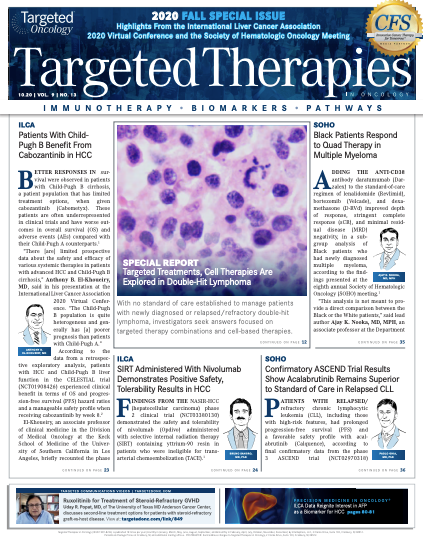Lessons From Clinical Trial Setbacks Lead to Next Phase of Oncologic Advances
In the wake of the enthusiasm around cancer immunotherapy trial results—with several positive trials presented annually at each American Society of Clinical Oncology meeting in more and more diseases over several years—setbacks have served as a grim reminder that our work is not finished.
Robert L. Ferris, MD, PhD

It was certainly inevitable. In the wake of the enthusiasm around cancer immunotherapy trial results—with several positive trials presented annually at each American Society of Clinical Oncology (ASCO) meeting in more and more diseases over several years—setbacks have served as a grim reminder that our work isn’t finished. Recently, the mood has changed to realism and, in some cases, pessimism, as some large trials reported as negative despite high expectations for efficacy. Although earlier efforts in the targeted therapies field had known limited success, the various cancers, immunotherapy, and cancer vaccine field had lived through sine waves of excitement and failure. From 2013 onward, anti–CTLA-4 and anti–PD-1/PD-L1 therapies seemed to work in nearly every disease in which a trial was conducted.
We perhaps became overconfident. Then came the PD-1/IDO (indoleamine 2,3-dioxygenase) experience at ASCO 2018 with the surprising negative phase 3 trial in melanoma.1 In the field of immunotherapy, we had been used to disappointing trials. In this case, however, based on the biology, it should have worked. Recent phase 3 practice-changing trials have increasingly been reporting negative. So what is the problem? And what can we learn?
In the past year or so, we have seen negative trials with anti–PD-L1 plus taxane in aggressive breast cancer, negative combinations including PD-L1 plus CTLA-4 targeting in head and neck cancer, and surprisingly, a lack of efficacy when adding anti–PD-L1 to chemoradiation in a trial that included an entire year of adjuvant avelumab (Bavencio). At least the 1 year of avelumab, like the PACIFIC trial in non–small-cell lung cancer, should have salvaged any biologically inert effect of adding the antibody during chemoradiation.
So are the setbacks a matter of trial design—incomplete understanding of tumor cell and microenvironment biology? Or is it simply a technical defect in the study design and population eligibility? The secret and answer may lie in the populations enrolled and the method of enriching for likely responders.
An interesting lesson comes from the HRAS field, where HRAS-mutated but otherwise unselected patients were entered into a trial of tipifarnib, a farnesyltransferase inhibitor (FTI). The biology indicated that FTI inhibition would selectively work in HRAS-mutated cancers. However, the trials were negative, and the drug was put on the shelf. It was recently salvaged with an attempt to increase the fraction of high variant allele fraction (VAF)—in other words, those patients much more likely to benefit because HRAS was a “driver,” rather than a passenger, alteration. Data suggested that this approach of enriching high-responding patients is not simply a construct of biostatistical study design, but rather an existential question for drugs currently on the market or hoping to be so in various cancer types.2 Therefore, scientists and translational investigators need to go back to the laboratory, analyze data, and curate their specimens genomically and immunologically to ensure we understand whom we are entering into which trials and whether the biology enriches the likelihood of success.
So the field is bright with a seemingly never-ending list of novel agents and repurposed drugs targeting known and uniquely identified pathways. We stumbled upon PD-1 inhibitors nearly 10 years ago and are yet to find the next successor with pan-tumor activity. Cancer is complex, patients are heterogeneous, and the biology of tumor escape has had 10 or more years of lead time in the patient before the oncology community had a chance to introduce antitumor therapies in the context of prospective randomized trials. So we should not despair, but rather, beat the cancer at its own game—segmenting it into the biology of driver genomic and immunologic dependencies, identifying them with the most novel techniques available, and integrating these into tissue-intensive, patient-enriched clinical trials, with unique adaptive designs to rapidly identify resistance or response.
We need to leverage neoadjuvant preoperative clinical trials, with on-treatment biopsies, to identify dynamic biomarkers and therapy-directed changes in the tumor microenvironment. This combined with collaboration between academia and industry hold promise for moving to the next successful phase of oncologic therapies while also trying to shortcut the large multiyear randomized phase 3 trials of unselected patients relying on a battery of retrospective static, pretreatment biomarkers tested in paraffin. That got us to this point, but the challenge is to move to the next phase. Our patients demand it, and the field is prepared.
References:
1. Long GV, Dummer R, Hamid O, et al: Epacadostat (E) plus pembrolizumab (P) versus pembrolizumab alone in patients (pts) with unresectable or metastatic melanoma: Results of the phase 3 ECHO-301/KEYNOTE-252 study. Presented at: 2018 ASCO Annual Meeting; June 1-5, 2018; Chicago, IL.
2. Sternberg A. Tipifarnib yields 100% disease control in HRAS-mutant head and neck squamous cell carcinoma. Targeted Oncology™. December 3, 2019. Accessed September 16, 2020. https://bit.ly/2RycZu4

Survivorship Care Promotes Evidence-Based Approaches for Quality of Life and Beyond
March 21st 2025Frank J. Penedo, PhD, explains the challenges of survivorship care for patients with cancer and how he implements programs to support patients’ emotional, physical, and practical needs.
Read More